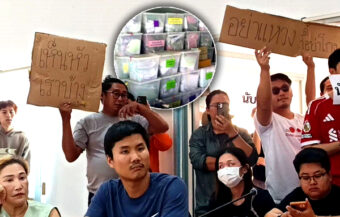Thailand’s 2027 negative income tax plan, backed by experts, aims to cut poverty, tackle inequality, modernise welfare, integrate the informal economy and give millions of low-income citizens a lifeline while strengthening the nation’s fiscal health.
Thailand plans to introduce a negative tax system by 2027, and it’s gaining strong backing from experts and the private sector. Finance Ministry Permanent Secretary Lavaron Sangsnit unveiled the proposal this week. The move could transform the economy and reshape society. It aims to slash the sprawling black market and force money into the formal system. At the same time, it would build collective responsibility for national growth. The plan directly tackles rising inequality. Today, 14.55 million people live below the poverty line, worsened by the COVID-19 crisis. If implemented, it could give struggling citizens a lifeline while shoring up the country’s fiscal health.

Thailand plans to roll out a negative income tax system by 2027. The Ministry of Finance says every citizen—about 60.8 million people—must file income tax returns. Around 600,000 businesses will also be required to comply. Those earning below a certain threshold will receive money from the government, not pay it. This is a radical shift in how Thailand delivers welfare. For low-income earners, it could mean stability and dignity. For the country, it could mean structural change.
The pandemic made one thing clear: the current system is broken. COVID-19 didn’t just cause economic pain—it exposed deep structural cracks. Vulnerable groups were left behind. Informal workers had no safety net. Income inequality surged. Although economic activity has resumed, poverty is once again on the rise.
In 2012, only 8.4 million people were officially poor. This was reduced in a decade of progress from 19.9 million. Today, it’s over 14.5 million. The pandemic isn’t solely to blame. Trade wars, automation and demographic shifts are also at play.
Thailand aims to implement a negative income tax to provide relief and modernise welfare for millions
Therefore, this new system is more than a policy—it’s a necessity. If done right, it can close long-standing gaps in welfare delivery. The government says it will use tax filings to identify who needs support. In theory, this makes welfare automatic, accurate, and fast. Instead of applying for assistance, citizens will qualify through their income data. As a result, duplication and inefficiency can be reduced. However, none of this will work without data. That is the first major hurdle.
Thailand’s current infrastructure is not ready. The digital backbone is weak. Data verification systems are outdated. Many rural communities still lack reliable internet access. If the system cannot identify who is poor, it will collapse. Fraud, false claims, and underreporting are real risks. Therefore, the reform must be paired with robust auditing tools. The tax authority will need to track income more precisely than ever before.
Asst. Prof. Dr. Yutthana Srisawat, CEO of iTAX and a former head of the Thai Startup Trade Association, supports the policy. He argues that Thailand cannot move forward without a reliable, centralised tax database.
In his view, three benefits stand out. First, the government can finally target assistance based on real need. Second, overlapping welfare programs can be consolidated. Third, the informal economy—which currently accounts for more than half of GDP—can be brought into the system.
Negative income tax could target real need, reduce overlap in welfare, and integrate informal economy
This has never been done on such a scale in Thailand. For example, during the pandemic, millions had to re-register for help every time a new scheme was launched. With this reform, such chaos could be avoided. Nonetheless, Dr. Yutthana warns of the complexity. Budgeting will be a major concern. How much will each person receive? Can the national budget sustain it? Without clear answers, the system risks becoming politically unsustainable.
Expanding the tax filing base to every adult will also introduce new problems. Many people have never filed taxes before. Some lack bank accounts or smartphones. Others don’t trust the system. Consequently, the government must launch a nationwide digital education campaign. It must also simplify the filing process to avoid mass confusion. Communication will be just as critical as technology. People need to understand what’s changing—and why.
Dr. Anusorn Thamjai, Dean of Economics at the University of the Thai Chamber of Commerce, supports the reform but offers strong cautions. He emphasises that simply handing out money will not solve everything.
Thailand needs to adopt multidimensional poverty measures beyond cash transfers for protection
Thailand must adopt a multidimensional view of poverty. That means addressing income, education, healthcare, housing and employment together. Many informal workers live just above the poverty line, yet they remain vulnerable to shocks. A temporary illness or job loss can push them back into poverty overnight.
Dr. Anusorn also warns that poorly targeted subsidies often backfire. Fuel and energy subsidies, for instance, distort prices and help the wealthy more than the poor. Instead, direct transfers based on tax data are more efficient.
However, they must be accurate. Inclusion errors—where unqualified people get support—waste money. Exclusion errors—where the poor are missed—create injustice. Both must be minimised. This is only possible through a modern, verified welfare database.
He proposes a new eligibility framework based not only on income, but on multiple risk factors. This could include health, housing, job security and education access. He believes such a system would be more responsive and fair. However, it would also be more expensive. The question remains: can Thailand afford it?
Comprehensive eligibility must include income, health, housing, jobs and education to ensure fairness
If poverty levels stay high, the state may need to spend tens of billions of baht every year. That could strain national finances. Investments in infrastructure, education, or research may be delayed or cancelled. Therefore, long-term sustainability must be addressed now.
Dr. Anusorn urges the government to reform the tax base. He advocates for a shift toward asset-based taxation. Properties, investments, and wealth must be taxed more effectively. Otherwise, the financial burden will fall on middle-class workers.
Economic growth will also be crucial. Without higher growth, the revenue needed to fund these reforms will not materialise. Private investment must rise. Labour productivity must improve. If not, the welfare system will become a permanent fiscal drag.
Moreover, automation and artificial intelligence will reshape the labour market. Millions may lose their jobs in the next decade. For them, a guaranteed minimum income could offer both stability and transition.
Sustainable funding requires growth, asset taxation and support for workers in evolving labour market
Eventually, the negative income tax could evolve into such a system. But that will require vision, discipline and time. The political obstacles are also considerable. Existing welfare programs have strong political support.
Replacing them will be controversial. Still, the new model could be introduced alongside current schemes and phased in gradually. Linking it to voluntary social security contributions under Section 40 could increase buy-in among informal workers.
Huge economic change as Reverse Tax plan is being pushed by the Pheu Thai government as it battles on
The private sector has also backed the proposal. However, businesses urge the government to keep the system simple and accessible. Complexity will lead to confusion, fraud and public distrust.
As the 2027 deadline approaches, the clock is ticking. The plan is bold, but boldness alone won’t be enough. Success will depend on infrastructure, transparency and trust. Without all three, the system could fail before it even starts.
Join the Thai News forum, follow Thai Examiner on Facebook here
Receive all our stories as they come out on Telegram here
Follow Thai Examiner here
Further reading:
Expert warns foreign tourism has become Thailand’s curse, fueling inertia and a widespread malaise
Thaksin does not rule out joining talks in US as Thai team finalises plans. They fly out on Thursday


















